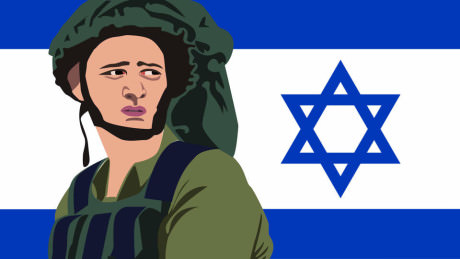As a medium for understanding what has been going on in the Israel-occupied territories, the art of theater can do something that other media cannot. Theater can narrate events and tell stories, of course; but it can also make the human emotions in dramatic encounters present and palpable. Theater can make feelings feel so real that we feel something akin to them too. As evidenced by a theater piece that opened last night, the resulting performance experience can be gripping. “It’s What We Do”: A Play About the Occupation is a powerful staging of a powerful script with a powerful moral meaning.
There was barely a sound in the sold-out opening night audience. There was nearly sustained pin-drop silence. Only one brief tragifarcical scene (an amusing bit about border-crossing bureacracy) got an audible response. All the rest of the time it was as if one could hear the audience listening, taking it all in, trying to process the unprocessable—in empathic response to the emotions being enacted and in stilled, chilled bewilderment at the inhumanity being depicted.
At a Busboys and Poets program in fall 2013, Playwright and Director Pamela Nice happened to hear a former Israeli Defense Forces solder speak out about the horrors of the Israeli occupation. That led her to discover an organization called Breaking the Silence, which has assembled a chorus of testimony about those horrors from other IDF service people. (Even a cursory glance at the group’s website offers a troubling look at the experience of soldiers whose consciences were military casualties.) Artfully, Nice has crafted excerpts from truth-telling about the 1967 occupation into a stage play featuring three Solders, composites representing an army of silence-breakers (compellingly played by Olivia Haller, Tariq Triano, and Keanu Ross-Cabrera), who are debriefed by an interviewer, an eerily uninflected offstage Voice (Dior Ashley Brown).
As the soldiers speak their verbatim testimony, their words now and then segue into short scenes, like tableaux vivants, which vividly demonstrate the solders’ horrific acts against Palestinians (who are played variously by a wonderful supporting ensemble: Moses Bernal, Sofia Pellegrino, Jamal Najjab, Xavier Goytia, and sisters Jaelyn and Izabella Cruz).
The cast has clearly been well-directed to communicate the truth of each emotional moment. Time and again, one could read on their faces and in their quavering voices whole chapters of distress where there was but a line of dialogue. And in the midst of the extensive combat choreography—when the Israeli soldiers routinely assaulted the Palestinians—cries of the heart could be heard with heartbreaking immediacy.
“Our mission was to disrupt and harrass people’s lives,” says one Soldier succinctly. And that is exactly what “It’s What We Do” puts on stage: Ransacking homes and blowing up houses (euphemized as “changes of address”). Bulldozing centuries-old orchards. Jewish-only roads that Arabs are forbidden to travel. Brutal checkpoint assaults. Denial of work permits for anyone whose distant relative ever so much as threw a stone at an Israeli (meaning that nearly no Palestinian can earn a livelihood). Doing whatever it takes to defend the Jewish settlers’ claimed authority to live on land that once was Arabs’.
The catalog of indignities and atrocities that were these soldiers’ job to perform leaves them in an agony of inner conflict. They speak of being torn between the national loyalty of being born an Israeli and the awful recognition that that heritage now requires victimizing innocent Palestinian civilians. As one Soldier says, “The settlers are the closest to Jewish Nazis I’ve ever met.”
This is an extraordinary work of theater—disturbing in the most important sense that it provokes real-time reckoning with real-world morals and places the meaning of human emotions center stage. “It’s What We Do”: A Play About the Occupation is a play that one must think about and talk about after. But first and foremost, it must be seen.
Running Time: 45 minutes, with no intermission.
“It’s What We Do”: A Play About the Occupation plays through July 25, 2015, at Atlas Performing Arts Center: Lab II – 1333 H Street, NE, in Washington, DC. For a schedule of performances and to purchase tickets, go to their Capital Fringe page.
LINK
Read the preview article on DCMetroTheaterArts.
RATING: THE BEST OF THE 2015 CAPITAL FRINGE






Very accurate review of a phenomenal production. I was in the opening night audience and was amazed that this diverse cast did such an amazing job of capturing the emotions of both sides of this conflict. Bravo!
Mr. Fischer,
May I suggest that you hold off your unsubstantiated attacks of the play “It’s What We Do” until after you have seen the play on Wednesday. I myself find it difficult to criticize a play objectively if I haven’t sat through a full performance of the play.
How dare you remove my posts? I had planned to see the play this past weekend but was unable to for logistical reasons. However, it is clear from the publicity of the play on the play’s website, to say nothing of the comments presented by the author/director, that this play is meant to lend the belief that Israel is completely to blame for the sad situation in the Middle East. Her comments insinuating that Israel’s military action in Gaza last year was without reason was particularly a whitewash of history and ignoring reality. I will have you know that I wrote similar comments to your reviewer in a private message and he suggested that I post the comments here, albeit after I had already done so. I will absolutely post my comments after seeing the show on Wednesday, but I wanted people to know that based on the author’s comments on the show’s page, it is clear what her true purpose is.
I saw this play on July 15th. It is a portrayal of the dehumanizing way Israeli settlers in the West Bank treat Palestinians and incidents in which Israeli soldiers destroyed Palestinian homes and property, and harassed Palestinians without any intelligence of a terrorist threat. In case the subject matter doesn’t have you hating the Israelis, the production doubles down with an offstage moderator on mic, asking loaded questions and making indignant comments on the stories of the actor/soldiers. Also, in case you miss the point, the production has women and children being terrorized.
The problem with this play is that it so grossly overplays its hand by its one-sidedness, painting Palestinians as all victims and Israelis as all monsters (some of whom now feel guilty), it is hard not to believe that the real intent is to discredit Israel and encourage the boycott, divestment and sanctions movement (which at least one of the sponsoring groups of this play supports).
Before I go any further, let me say that I have always opposed Israeli settlements in the West Bank (and, before they were dismantled in 2005, in Gaza). I abhor all of the incidents presented in the play and believe that the settlers, soldiers and, when complicit, the Israeli government, should be held responsible for their occurrence.
That said, by watching this play you would never know that there really are terrorists that come from the West Bank to blow up Israeli civilians in busses and restaurants and markets. You would never know that there is a real security reason for border checkpoints into Israel. To the extent that soldiers exceed their task to protect Israel from a terrorist threat and harass innocent Palestinians and destroy their property, they should be punished. However, Israeli citizens have a right to be protected from actual terrorist activity when it presents itself from a people that have, in large part, consistently sought Israel’s total destruction.
The play also is not above relaying distortions of facts to make its points. One soldier says that the reason for Israeli activities in the West Bank is because of the settlements there (in reality, Israel first occupied the territory during the Six Day War in 1967, when Israel defended itself from a mobilization by Egypt and subsequent attacks by Jordan and Syria). Another actor says that nobody in Israel cares about Palestinians (tell that to Israelis outside of the Likud or other right-wing parties).
There are many more points of this kind I could make (I took five pages of notes) but you get the idea. At the discussion period afterwards, the presenting group stated that the play was not meant to tell all sides of the conflict. but is meant to be a “small story”, only one part. This is a disingenuous defense of a play in which ALL of the characters (yes, I know this is based on real people), scenes, statements and actions present the same view–the Palestinians are all victims, the Israelis are all monsters (except when the soldiers stand against the Israeli settlers). Imagine the reaction from Palestinians if a play was presented in which they were only portrayed as terrorists and the Israelis could do no wrong. It would be more convincing that the purpose of this play is to promote peace in the region if it presented the injustices and griefs perpetrated by each side, rather than a heavy-handed, one-sided portrayal.
Mr. Stewart it is clear that you already had an opinion, a very strong opinion before you ever came in and watched the play. It is by your choice that you ignored the conversation after the placing that this is but a small portion of a larger story. This particular play was the highlight that particular portion. The rest of the audience picked up on that but you were so stuck on being insulted and upset that you chose not to hear that. Of course people on both sides are doing things that are inappropriate and wrong towards each other and their own people. But if you strip away all of the “Eye for and eye” feeling, and at least understand that the Palestinians are being treated less than human then at the very least you can relate to what was presented rather than thinking that this was a anti-Israeli play.
bunch of liars.. i didn’t see the show, and i know exactly what is it about.. lies and lies and more lies.. check Pallywood online and a whole new world will open to you.. those “Israelis” who trying to get some outside “love”.. Me, and ALL the people around me served in the IDF , and i can tell you one thing for sure – IDF is the most humanity army in the world (i would say even way way way too humanity).. u have any idea how many soldiers died because the “army” didn’t want to hurt by mistake uninvolved citizens? it is dosnt make any sense and that is our mistake (as Israelis) , that we dont act like everyone else.. specialty not like the “Palestinians” (there is no really nation like that).. I would love to talk to anyone who is realy looking for ther true. Sorry about my English.. Not my first language.. [email protected]
I think people should see the show before making comments.
Some of the best propaganda has been transmitted via theater. This play is no exception.. Brutalities are on both sides. Palestinian suicide bombers igniting themselves in pizza shops killing and maiming men, women, and children. For each anecdotal story told in this play, there are at least as many on the other side.
Israel won the West Bank not from the Palestinians but from Jordan after being attacked from it. Israel won Gaza from Egypt. There are no Jews left in Gaza after Israel deported their own people from there, in the hopes for peace. The Palestinians still claim “occupation” of Gaza. So since Israel won the remaining territory in question -the West Bank- from Jordan, whose territory are they occupying? Truth is, it is disputed territory. You will learn none of these truths in this one-sided piece of propaganda masquerading as a play.
There is no propaganda, this play is stating facts. But this does not take away from atrocities be done by both sides.
If you were to have seen the play then you would have heard from the director/playwright, that this is but one part of the story, one piece of a bigger picture.
Propaganda would be saying that this is not happening, which is untrue. Also the conversations held after do not attack the Israeli people but talk about the biased-ness from the Israeli government, and we could all agree that sometimes government paints a bad picture of the people they represent.
Moses,
You say that the director/playwright said “that this is but one part of the story, one piece of a bigger picture.” It was actually one side of one part of the story. There was no fairness showing the other side.
Propaganda is when one side of the story is told without mention of why soldiers are needed in Palestinian areas – Palestinian suicide bombings that have decimated families in Israel. Otherwise, the Israeli soldiers just seem to show up for no apparent reason – that is distortion – aka propaganda.
Lastly, what was totally missed by this play is that in Israel, all people are free to speak up about what they say is so. In Palestinian areas, or any Arab country for that matter, anything that counters the Palestinian narrative is met with murder. Those murdered are deemed “collaborators.” So of course you would never have the equivalent of this play on the Palestinian side, except those who realize death is a possibility. Read “Son of Hamas” to get an opposing point of view.